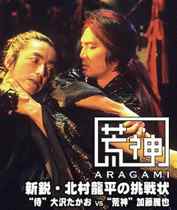 [vc_widget_sidebar sidebar_id=”sidebar-sidebar-reviews”]
[vc_widget_sidebar sidebar_id=”sidebar-sidebar-reviews”]
Arigami
Japan (2003), 70 minutes
As TS Eliot once said, “When forced to work within a strict framework the imagination is taxed to its utmost and will produce its richest ideas. Given total freedom the work is likely to sprawl. Aragami is a lesson in how limitations can be a blessing. The story of how those limitations came to be placed on director Ryuhei Kitamura began with a drunken challenge at the Berlin Film Festival. Kitamura and another director agreed to a cinematic duel in which each would produce a film that would take place in a single room, with only three actors, on a shoestring budget. The result is a film thats convinced me that all big-name directors in this country should be subject to a mandatory film duel at least once a decade.Ill admit Ive found Kitamuras sensory onslaught to be a bit much at times, so seeing him work within such strict boundaries is quite a treat for me. The story is simple, as it should be. Two wounded samurai wind up at the doorstep of an aragami (defined here as a “fierce deity). For the aragami to be released from the curse of immortality, he must be defeated in battle, so he saves one of the samurai with the hopes of setting up a duel.
Like all of my favorite Japanese films, Aragami doesnt erupt into fight scenes until the end. And it doesnt disappoint. Funny how a fight involving immortals ends up being one of the more realistic scenes Ive seen all year. Kitamura does better when his hyperkinetic imagination is restricted by budget and cast members. Instead of overloading us with boggling enemy numbers, digital effects, and geysers of blood, we get some incredibly innovative uses of light and darkness, aerial views, and great editing.
Of course, a film with only three actors and only one fight scene is going to involve a lot of talking. Here, Kitamura’s actors do a great job with timing and uncomfortable silences. They also pull off some subtle humor quite well, and Takao Osawa has one of my favorite on-screen laughing fits.
Kitamura, who co-wrote the story and screenplay, uses all this externally imposed quiet time to ruminate on some interesting themes: the pleasures of being mortal, the deception of appearances, the acceptability of suicide, and the benefits of eating liver.
Aragami is a sheer pleasure. Its back-to-basics approach proves that all the money in the world cant make up for imagination and good ideas. Sometimes actually, most of the time you have to be placed in a box before you can think outside of one.
